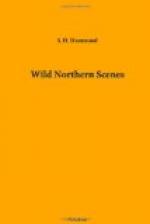The people, whoever they were, who prepared the camp in which we were domiciled, had an eye to convenience and comfort. The shanty was built of logs, on three sides, the crevices between which were filled with moss, and the sloping roof neatly covered with bark, in layers, like an old-fashioned roof, covered with split shingles. The front was open, and directly before it was a rough fire-place, with jams, made of small boulders, laid up with clay, regularly-fashioned, as if intended for a kitchen. This fire-place was three or four feet high, and served an excellent purpose, with reference to our cookery, and the lighting of our shanty at night. It served, also, to conduct the smoke upward, and prevented it from being blown into our faces, as we sat in front, at once, of our sleeping-place and our camp-fire. The only things that reminded us of civilization, aside from what we carried with us, were the innumerable crickets that, through all the night, kept up their chirruping in the crevices of this rude fireplace. There was something old-fashioned and sociable in their song. These, with the shrill notes of the little peepers along the shore, were old sounds to us, familiar voices, and they fell pleasantly on the ear. We had finished our meal, and taken to our pipes in the evening, as the sun went down among the old forests, away off in the west. The greyness of twilight came stealing over the water, and grew into darkness in the beautiful valley where that lake lay sleeping. The stars stole out silently, and set their watch in the sky, and calmness and repose rested upon everything around us.
“I remember,” said Smith, “the first year that I was in college, of hearing two learned professors disputing about what sort of animal it was that made the piping noise we hear in the marshy places, and stagnant pools, in the spring time, usually known as peepers. One insisted that it was a newt, or small lizard; and I remember that he went to his library, and brought a volume which proved his theory to be correct. The other denied the authority of the author, and insisted that the peeper was a frog. The discussion excited my curiosity, and I made up my mind to satisfy myself on the subject, if possible, by occular demonstration. There was a small marshy place, half a mile, or so, from the college grounds, from which I had heard, in my walks, the music of the peepers coming up every evening, in a loud and joyous chorus. I watched by it a number of evenings, and though there were a plenty of peepers, piping merrily enough, yet I could not get sight of one to save me. I began to think it was a myth, the viewless spirit of the bog, that made all the noises about which the learned professors had been disputing. At last, however, I got sight of a peeper, caught him in the act, and saw that it was, in fact, a little frog, nothing more, nothing less. He was not more than three feet from me, and though, when I moved, he hid himself in the muddy




